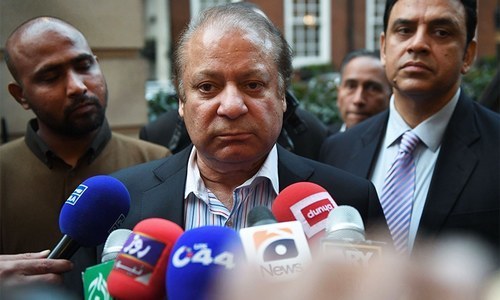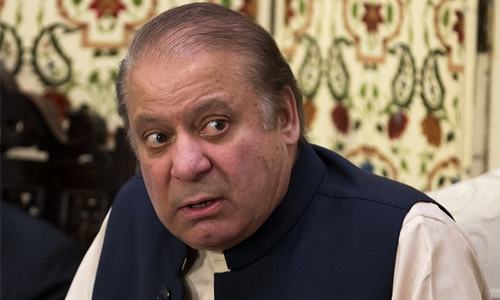ISLAMABAD: The second reference against former prime minister Nawaz Sharif almost concluded on Wednesday after the lead defence counsel completed final arguments in the Al-Azizia/Hill Metal Establishment (HME) reference.
Additional deputy prosecutor general of the National Accountability Bureau (NAB) Sardar Muzaffar Abbasi, however, asked for more time to rebut arguments of Mr Sharif’s counsel.
Mr Abbasi assured the accountability court that he would conclude the rebuttal by Thursday afternoon.
NAB lawyer seeks more time to rebut defence’s stance
Concluding the final arguments, lead defence counsel Khawaja Haris contended that investigation could not prove that Mr Sharif became influential only after becoming a public office holder.
He claimed that the former prime minister belonged to a leading industrialist family decades before he entered politics.
Regarding the declaration of assets of Hussain Nawaz, Mr Haris told the court that being a non-resident Pakistani, Hussain was not under any legal obligation to declare his assets before Pakistani authorities, and the prosecution never pointed it out in the reference that he did not declare his assets.
He argued that the investigation officer did not probe transfer of various amounts of money from the accounts of Hussain Nawaz to his father.
In reply to a question asked by the court during the recording of the statement of Mr Sharif under Section 342 of the Criminal Procedure Code whether Mr Sharif was not aware of the businesses of his children, Mr Haris argued that being the father, the business of his sons was in the knowledge of the former prime minister, but he was not involved in any of their businesses.
“Our case is simple: Hussain Nawaz owns Al-Azizia/HME and he is responsible for and answerable to establishment and operation of these concerns,” argued the defence counsel, adding that NAB could not seek explanation from his father with reference to these companies.
He pointed out that the Joint Investigation Team (JIT) constituted to probe the Panamagate scam did not make the documentation regarding mutual legal assistance (MLA) it wrote to the Saudi government. A day earlier, the defence counsel told the court that JIT’s MLAs sent to Saudi authorities were ‘incomplete’ since the investigation team did not even mention the complete nomenclature of the HME.
He disclosed that in addition to Mr Sharif, HME remitted amounts to at least five other persons, but they were never associated in the investigation to ascertain whether they were shareholders or employees of the HME.
Accountability judge Mohammad Arshad Malik reminded the defence counsel that Hussain Nawaz could clear this ambiguity if he joined the NAB investigation.
At this, Mr Haris said that NAB then would use his statement, adding that Hussain and Hassan Nawaz had produced an affidavit of Tariq Shafi in support of their money trail, but this was now being used against his client even without providing him an opportunity to cross-examine Mr Shafi.
After the defence counsel concluded the final arguments, prosecutor Abbasi requested the court to allow him to rebut the arguments of the defence counsel.
The judge asked if the defence counsel had made something in addition to what he had already stated before the court.
Mr Abbasi said that there were some points which he wanted to explain to the court.
Subsequently, the proceedings were adjourned till Thursday.
Nawaz Sharif appeared before the court and, after witnessing the proceedings, left the courtroom with the permission of the accountability judge.
Published in Dawn, December 13th, 2018

















































